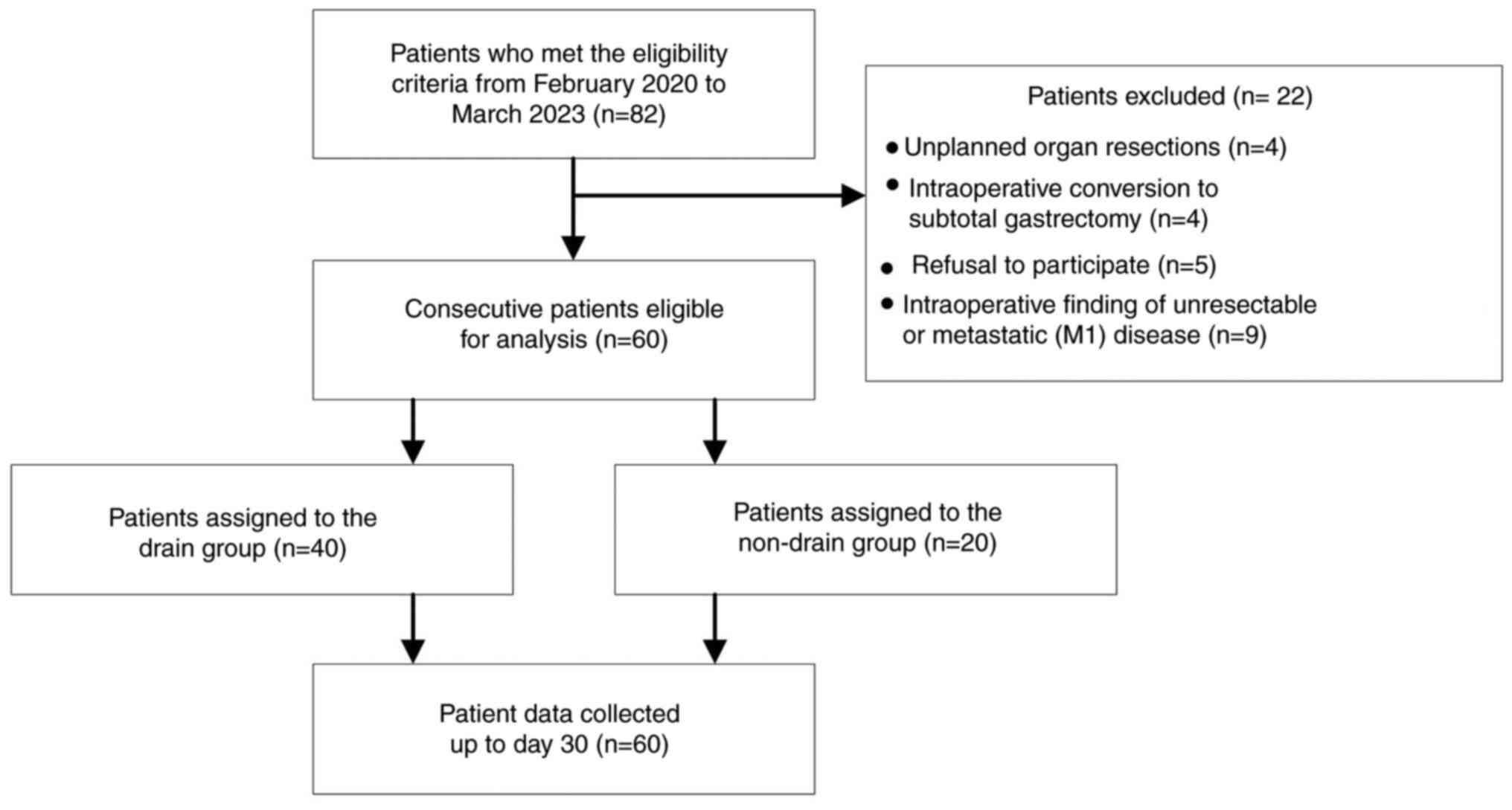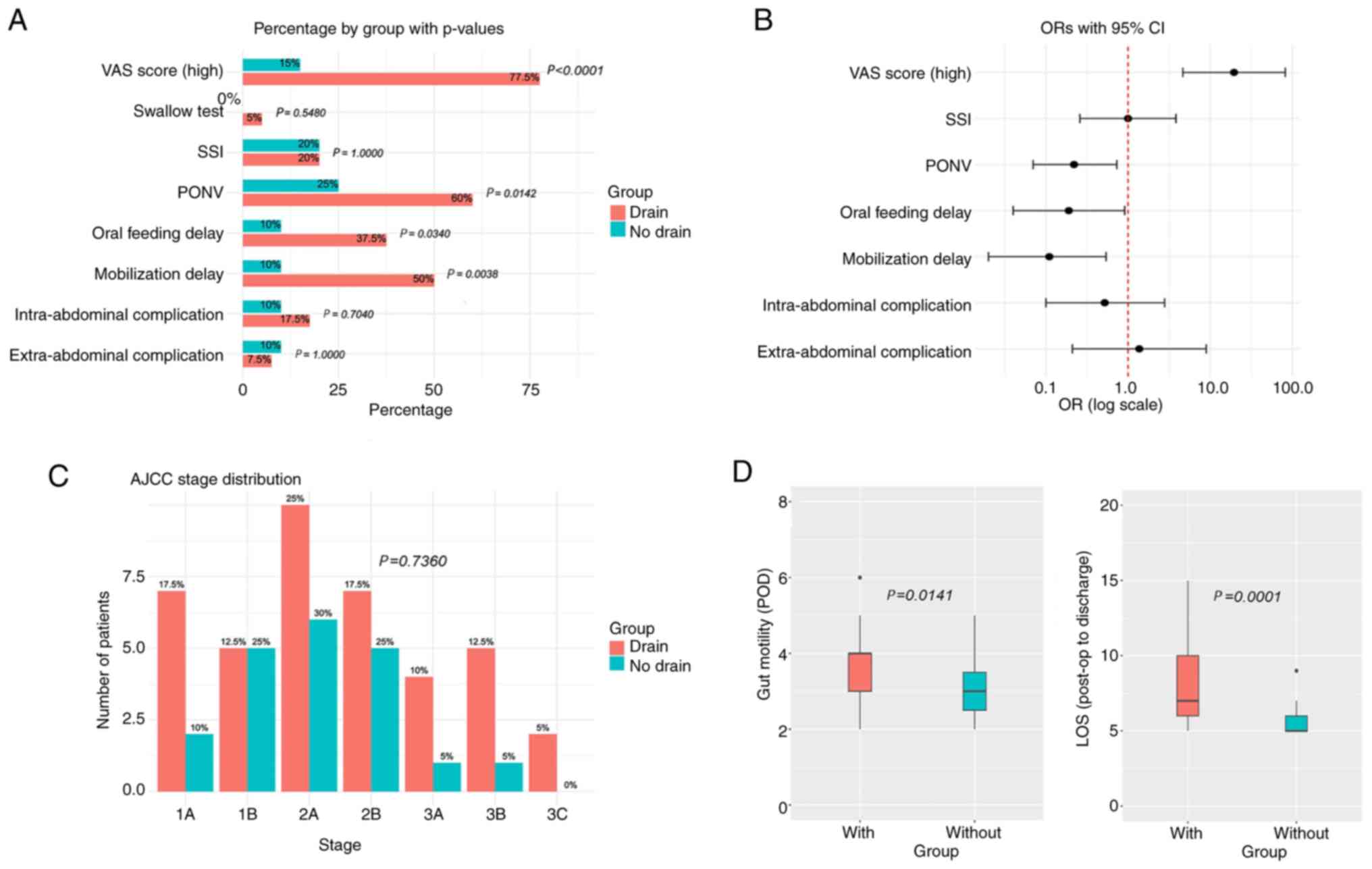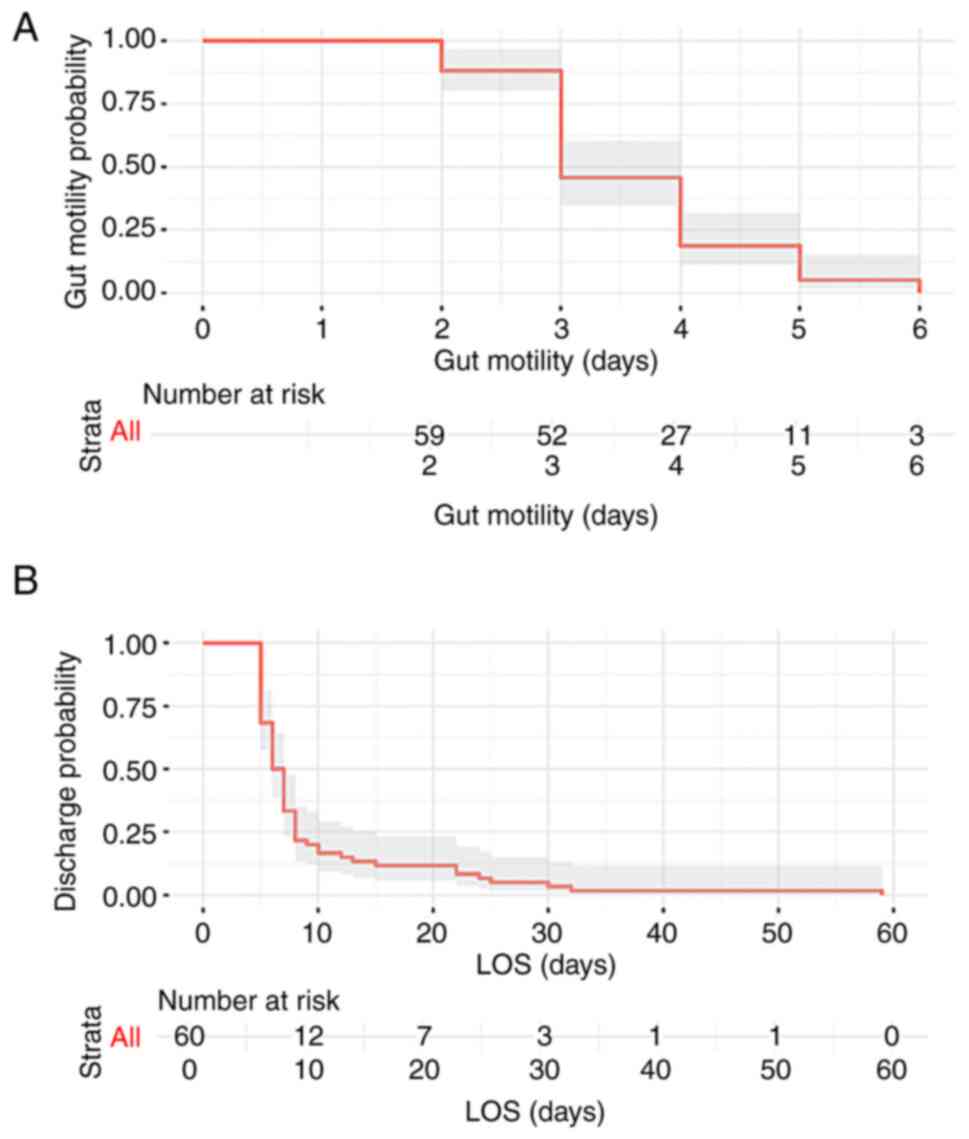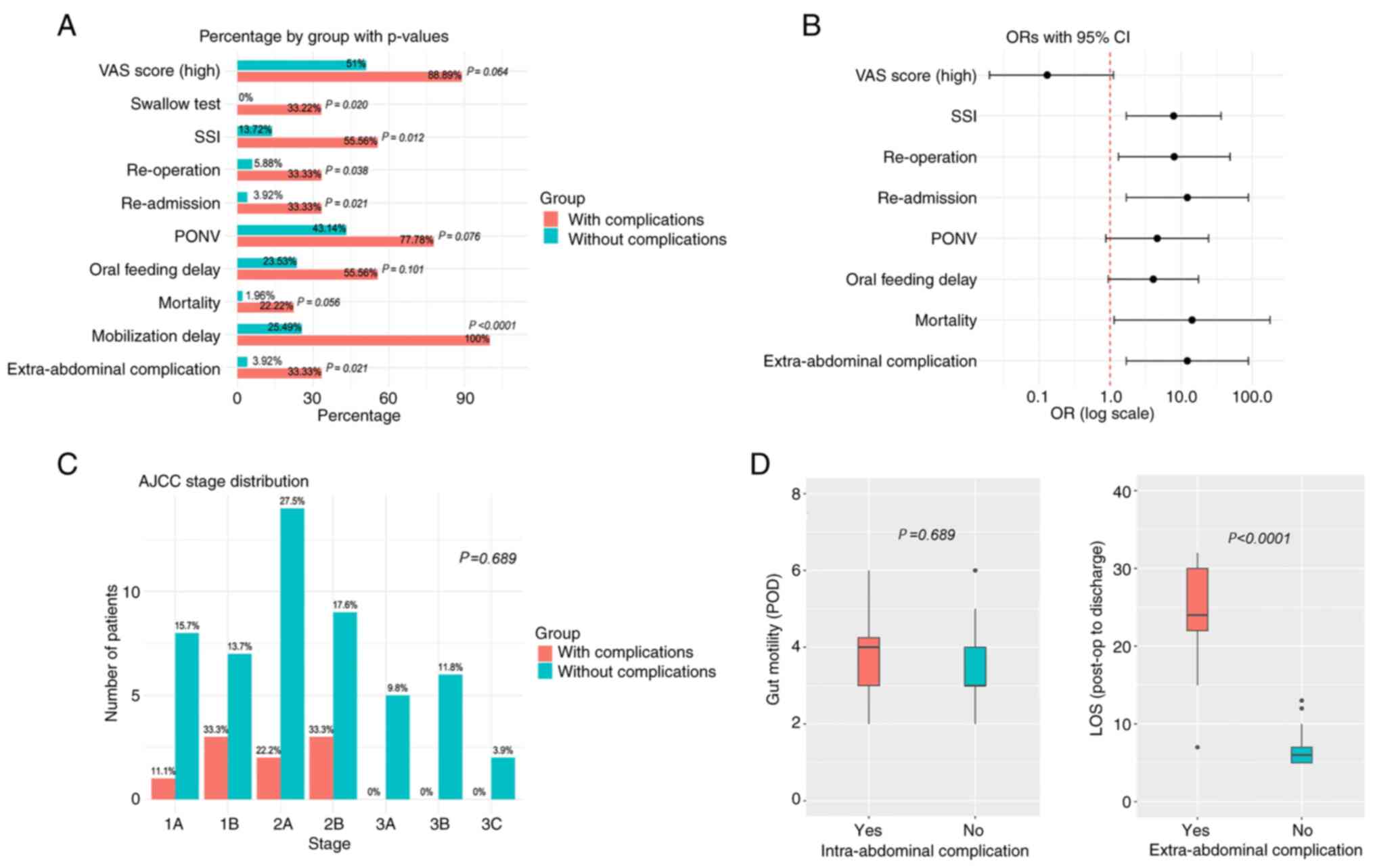|
1
|
Bray F, Laversanne M, Sung H, Ferlay J,
Siegel RL, Soerjomataram I and Jemal A: Global cancer statistics
2022: GLOBOCAN estimates of incidence and mortality worldwide for
36 cancers in 185 countries. CA Cancer J Clin. 74:229–263.
2024.PubMed/NCBI View Article : Google Scholar
|
|
2
|
Lordick F, Carneiro F, Cascinu S, Fleitas
T, Haustermans K, Piessen G, Vogel A and Smyth EC: ESMO Guidelines
Committee. Electronic address: clinicalguidelines@esmo.org. Gastric
cancer: ESMO Clinical Practice Guideline for diagnosis, treatment
and follow-up. Ann Oncol. 33:1005–1020. 2022.PubMed/NCBI View Article : Google Scholar
|
|
3
|
Ajani JA, D'Amico TA, Bentrem DJ, Chao J,
Cooke D, Corvera C, Das P, Enzinger PC, Enzler T, Fanta P, et al:
Gastric cancer, version 2.2022, NCCN clinical practice guidelines
in oncology. J Natl Compr Canc Netw. 20:167–192. 2022.PubMed/NCBI View Article : Google Scholar
|
|
4
|
Huang N, He HW, He YY, Gu W, Xu MJ and Liu
L: Xiaotan Sanjie recipe, a compound Chinese herbal medicine,
inhibits gastric cancer metastasis by regulating GnT-V-mediated
E-cadherin glycosylation. J Integr Med. 21:561–574. 2023.PubMed/NCBI View Article : Google Scholar
|
|
5
|
Yan L, Li W, Chen F, Wang J, Chen J, Chen
Y and Ye W: Inflammation as a mediator of microbiome
Dysbiosis-associated DNA methylation changes in gastric
premalignant lesions. Phenomics. 3:496–501. 2023.PubMed/NCBI View Article : Google Scholar
|
|
6
|
Kim SG, Seo HS, Lee HH, Song KY and Park
CH: Comparison of the Differences in Survival Rates between the 7th
and 8th Editions of the AJCC TNM staging system for gastric
adenocarcinoma: A Single-institution study of 5,507 patients in
Korea. J Gastric Cancer. 17:212–219. 2017.PubMed/NCBI View Article : Google Scholar
|
|
7
|
Ljungqvist O, Young-Fadok T and Demartines
N: The history of enhanced recovery after surgery and the ERAS
society. J Laparoendosc Adv Surg Tech A. 27:860–862.
2017.PubMed/NCBI View Article : Google Scholar
|
|
8
|
Tanious MK, Ljungqvist O and Urman RD:
Enhanced recovery after surgery: History, evolution, guidelines,
and future directions. Int Anesthesiol Clin. 55:1–11.
2017.PubMed/NCBI View Article : Google Scholar
|
|
9
|
Park KB, Park JY, Lee SS, Chung HY and
Kwon OK: Chronological changes in quality of life and body
composition after gastrectomy for locally advanced gastric cancer.
Ann Surg Treat Res. 98:262–269. 2020.PubMed/NCBI View Article : Google Scholar
|
|
10
|
Ikeda M, Yoshida M, Mitsumori N, Etoh T,
Shibata C, Terashima M, Fujita J, Tanabe K, Takiguchi N, Oshio A
and Nakada K: Assessing optimal Roux-en-Y reconstruction technique
after total gastrectomy using the Postgastrectomy Syndrome
Assessment Scale-45. World J Clin Oncol. 13:376–387.
2022.PubMed/NCBI View Article : Google Scholar
|
|
11
|
Pinheiro RN, Mucci S, Zanatto RM, Picanço
Junior OM, Bottino AAG, Fontoura RP and Lopes Filho GJ: Quality of
life as a fundamental outcome after curative intent gastrectomy for
adenocarcinoma: Lessons learned from patients. J Gastrointest
Oncol. 10:989–998. 2019.PubMed/NCBI View Article : Google Scholar
|
|
12
|
Husson O, de Rooij BH, Kieffer J,
Oerlemans S, Mols F, Aaronson NK, van der Graaf WTA and van de
Poll-Franse LV: The EORTC QLQ-C30 summary score as prognostic
factor for survival of patients with cancer in the ‘Real-World’:
Results from the Population-Based PROFILES registry. Oncologist.
25:e722–e732. 2020.PubMed/NCBI View Article : Google Scholar
|
|
13
|
Hu Y and Zaydfudim VM: Quality of life
after curative resection for gastric cancer: Survey metrics and
implications of surgical technique. J Surg Re. 251:168–179.
2020.PubMed/NCBI View Article : Google Scholar
|
|
14
|
Kehlet H and Mogensen T: Hospital stay of
2 days after open sigmoidectomy with a multimodal rehabilitation
programme. Br J Surg. 86:227–230. 1999.PubMed/NCBI View Article : Google Scholar
|
|
15
|
Shimoike N, Akagawa S, Yagi D, Sakaguchi
M, Tokoro Y, Nakao E, Tamura T, Fujii Y, Mochida Y, Umemoto Y, et
al: Laparoscopic gastrectomy with and without prophylactic drains
in gastric cancer: A propensity score-matched analysis. World J
Surg Oncol. 17(144)2019.PubMed/NCBI View Article : Google Scholar
|
|
16
|
Hirahara N, Matsubara T, Hayashi H, Takai
K, Fujii Y and Tajima Y: Significance of prophylactic
intra-abdominal drain placement after laparoscopic distal
gastrectomy for gastric cancer. World J Surg Oncol.
13(181)2015.PubMed/NCBI View Article : Google Scholar
|
|
17
|
Lee J, Choi YY, An JY, Seo SH, Kim DW, Seo
YB, Nakagawa M, Li S, Cheong JH, Hyung WJ, et al: Do all patients
require prophylactic drainage after gastrectomy for gastric cancer?
The Experience of a High-Volume Center. Ann Surg Oncol.
22:3929–3937. 2015.PubMed/NCBI View Article : Google Scholar
|
|
18
|
Kumar M, Yang SB, Jaiswal VK, Shah JN,
Shreshtha M and Gongal R: Is prophylactic placement of drains
necessary after subtotal gastrectomy? World J Gastroenterol.
13:3738–3741. 2007.PubMed/NCBI View Article : Google Scholar
|
|
19
|
Mortensen K, Nilsson M, Slim K, Schafer M,
Mariette C, Braga M, Carli F, Demartines N, Griffin SM and Lassen
K: Enhanced Recovery After Surgery (ERAS®) Group. Consensus
guidelines for enhanced recovery after gastrectomy: Enhanced
Recovery After Surgery (ERAS®) Society recommendations. Br J Surg.
101:1209–1229. 2014.PubMed/NCBI View Article : Google Scholar
|
|
20
|
Alvarez Uslar R, Molina H, Torres O and
Cancino A: Total gastrectomy with or without abdominal drains. A
prospective randomized trial. Rev Esp Enferm Dig. 97:562–569.
2005.PubMed/NCBI View Article : Google Scholar
|
|
21
|
Kim J, Lee J, Hyung WJ, Cheong JH, Chen J,
Choi SH and Noh SH: Gastric cancer surgery without drains: A
prospective randomized trial. J Gastrointest Surg. 8:727–732.
2004.PubMed/NCBI View Article : Google Scholar
|
|
22
|
Liu HP, Zhang YC, Zhang YL, Yin LN and
Wang J: Drain versus no-drain after gastrectomy for patients with
advanced gastric cancer: Systematic review and meta-analysis. Dig
Surg. 28:178–189. 2011.PubMed/NCBI View Article : Google Scholar
|
|
23
|
Wang Z, Chen J, Su K and Dong Z: Abdominal
drainage versus no drainage post gastrectomy for gastric cancer.
Cochrane Database Syst Rev: CD008788, 2011.
|
|
24
|
Mahendran R, Tewari M, Dixit VK and Shukla
HS: Enhanced recovery after surgery protocol enhances early
postoperative recovery after pancreaticoduodenectomy. Hepatobiliary
Pancreat Dis Int. 18:188–193. 2019.PubMed/NCBI View Article : Google Scholar
|
|
25
|
Gustafsson UO, Scott MJ, Hubner M, Nygren
J, Demartines N, Francis N, Rockall TA, Young-Fadok TM, Hill AG,
Soop M, et al: Guidelines for perioperative care in elective
colorectal surgery: Enhanced recovery after surgery (ERAS®) society
recommendations: 2018. World J Surg. 43:659–695. 2019.PubMed/NCBI View Article : Google Scholar
|
|
26
|
Lim SY, Kang JH, Jung MR, Ryu SY and Jeong
O: Abdominal drainage in the prevention and management of major
Intra-abdominal complications after total gastrectomy for gastric
carcinoma. J Gastric Cancer. 20:376–384. 2020.PubMed/NCBI View Article : Google Scholar
|
|
27
|
Kanda M, Fujiwara M, Tanaka C, Kobayashi
D, Iwata N, Mizuno A, Yamada S, Fujii T, Nakayama G, Sugimoto H, et
al: Predictive value of drain amylase content for peripancreatic
inflammatory fluid collections after laparoscopic (assisted) distal
gastrectomy. Surg Endosc. 30:4353–4362. 2016.PubMed/NCBI View Article : Google Scholar
|
|
28
|
Taniguchi Y, Kurokawa Y, Mikami J, Tanaka
K, Miyazaki Y, Makino T, Takahashi T, Yamasaki M, Nakajima K,
Takiguchi S, et al: Amylase concentration in drainage fluid as a
predictive factor for severe postoperative pancreatic fistula in
patients with gastric cancer. Surg Today. 47:1378–1383.
2017.PubMed/NCBI View Article : Google Scholar
|
|
29
|
Kamiya S, Hiki N, Kumagai K, Honda M,
Nunobe S, Ohashi M, Sano T and Yamaguchi T: Two-point measurement
of amylase in drainage fluid predicts severe postoperative
pancreatic fistula after gastric cancer surgery. Gastric Cancer.
21:871–878. 2018.PubMed/NCBI View Article : Google Scholar
|
|
30
|
Kobayashi D, Iwata N, Tanaka C, Kanda M,
Yamada S, Nakayama G, Fujii T, Koike M, Fujiwara M and Kodera Y:
Factors related to occurrence and aggravation of pancreatic fistula
after radical gastrectomy for gastric cancer. J Surg Oncol.
112:381–386. 2015.PubMed/NCBI View Article : Google Scholar
|
|
31
|
Yamagata Y, Yoshikawa T, Yura M, Otsuki S,
Morita S, Katai H and Nishida T: Current status of the ‘enhanced
recovery after surgery’ program in gastric cancer surgery. Ann
Gastroenterol Surg. 3:231–238. 2019.PubMed/NCBI View Article : Google Scholar
|
|
32
|
Surgeons ACo: American College of
Surgeons' Standards for Gastric Cancer Surgery 2021 [15/10/2024].
Available from: https://decisionpoint.medscape.com/oncology/viewarticle/946018.
|
|
33
|
Lombardi PM, Mazzola M, Giani A, Baleri S,
Maspero M, De Martini P, Gualtierotti M and Ferrari G: ERAS pathway
for gastric cancer surgery: Adherence, outcomes and prognostic
factors for compliance in a Western centre. Updates Surg.
73:1857–1865. 2021.PubMed/NCBI View Article : Google Scholar
|
|
34
|
Salvans S, Grande L, Dal Cero M and Pera
M: State of the art of enhanced recovery after surgery (ERAS)
protocols in esophagogastric cancer surgery: The Western
experience. Updates Surg. 75:373–382. 2023.PubMed/NCBI View Article : Google Scholar
|
|
35
|
Gong W and Li J: Combat with
esophagojejunal anastomotic leakage after total gastrectomy for
gastric cancer: A critical review of the literature. Int J Surg.
47:18–24. 2017.PubMed/NCBI View Article : Google Scholar
|
|
36
|
Aurello P, Magistri P, D'Angelo F,
Valabrega S, Sirimarco D, Tierno SM, Nava AK and Ramacciato G:
Treatment of esophagojejunal anastomosis leakage: A systematic
review from the last two decades. Am Surg. 81:450–403.
2015.PubMed/NCBI
|
|
37
|
Trapani R, Rausei S, Reddavid R and
Degiuli M: ITALIAN RESEARCH GROUP FOR GASTRIC CANCER (GIRCG)
Clinical Investigators. Risk factors for esophago-jejunal
anastomosis leakage after total gastrectomy for cancer. A
multicenter retrospective study of the Italian research group for
gastric cancer. Eur J Surg Oncol. 46:2243–2247. 2020.PubMed/NCBI View Article : Google Scholar
|
|
38
|
Xing J, Liu M, Qi X, Yu J, Fan Y, Xu K,
Gao P, Tan F, Yao Z, Zhang N, et al: Risk factors for
esophagojejunal anastomotic leakage after curative total
gastrectomy combined with D2 lymph node dissection for gastric
cancer. J Int Med Res. 49(3000605211000883)2021.PubMed/NCBI View Article : Google Scholar
|
|
39
|
Aryaie AH, Singer JL, Fayezizadeh M, Lash
J and Marks JM: Efficacy of endoscopic management of leak after
foregut surgery with endoscopic covered self-expanding metal stents
(SEMS). Surg Endosc. 31:612–617. 2017.PubMed/NCBI View Article : Google Scholar
|
|
40
|
Choi CW, Kang DH, Kim HW, Park SB, Kim SJ,
Hwang SH and Lee SH: Full covered self-expandable metal stents for
the treatment of anastomotic leak using a silk thread. Medicine
(Baltimore). 96(e7439)2017.PubMed/NCBI View Article : Google Scholar
|
|
41
|
Dallal RM, Bailey L and Nahmias N: Back to
basics-clinical diagnosis in bariatric surgery. Routine drains and
upper GI series are unnecessary. Surg Endosc. 21:2268–2271.
2007.PubMed/NCBI View Article : Google Scholar
|
|
42
|
Haverkamp L, Weijs TJ, van der Sluis PC,
van der Tweel I, Ruurda JP and van Hillegersberg R: Laparoscopic
total gastrectomy versus open total gastrectomy for cancer: A
systematic review and meta-analysis. Surg Endosc. 27:1509–1520.
2013.PubMed/NCBI View Article : Google Scholar
|
|
43
|
Liu F, Huang C, Xu Z, Su X, Zhao G, Ye J,
Du X, Huang H, Hu J, Li G, et al: Morbidity and mortality of
laparoscopic vs open total gastrectomy for clinical stage I gastric
cancer: The CLASS02 multicenter randomized clinical trial. JAMA
Oncol. 6:1590–1597. 2020.PubMed/NCBI View Article : Google Scholar
|
|
44
|
Shi Y, Xu X, Zhao Y, Qian F, Tang B, Hao
Y, Chen J and Yu P: Short-term surgical outcomes of a randomized
controlled trial comparing laparoscopic versus open gastrectomy
with D2 lymph node dissection for advanced gastric cancer. Surg
Endosc. 32:2427–2433. 2018.PubMed/NCBI View Article : Google Scholar
|
|
45
|
Zhao B, Huang X, Lu H, Zhang J, Luo R, Xu
H and Huang B: Intraoperative blood loss does not independently
affect the survival outcome of gastric cancer patients who
underwent curative resection. Clin Transl Oncol. 21:1197–1206.
2019.PubMed/NCBI View Article : Google Scholar
|
|
46
|
Misawa K, Kurokawa Y, Mizusawa J,
Takiguchi S, Doki Y, Makino S, Choda Y, Takeno A, Tokunaga M, Sano
T, et al: Negative impact of intraoperative blood loss on long-term
outcome after curative gastrectomy for advanced gastric cancer:
Exploratory analysis of the JCOG1001 phase III trial. Gastric
Cancer. 25:459–467. 2022.PubMed/NCBI View Article : Google Scholar
|
|
47
|
Chen Cardenas SM, Santhanam P,
Morris-Wiseman L, Salvatori R and Hamrahian AH: Perioperative
evaluation and management of patients on glucocorticoids. J Endocr
Soc. 7(bvac185)2022.PubMed/NCBI View Article : Google Scholar
|
|
48
|
Marrelli D, Piccioni SA, Carbone L,
Petrioli R, Costantini M, Malagnino V, Bagnacci G, Rizzoli G,
Calomino N, Piagnerelli R, et al: Posterior and Para-Aortic
(D2plus) Lymphadenectomy after Neoadjuvant/conversion therapy for
locally Advanced/oligometastatic gastric cancer. Cancers.
16(1376)2024.PubMed/NCBI View Article : Google Scholar
|
|
49
|
Bassi C, Marchegiani G, Dervenis C, Sarr
M, Abu Hilal M, Adham M, Allen P, Andersson R, Asbun HJ, Besselink
MG, et al: The 2016 update of the international study group (ISGPS)
definition and grading of postoperative pancreatic fistula: 11
Years After. Surgery. 161:584–591. 2017.PubMed/NCBI View Article : Google Scholar
|
|
50
|
Jensen MP, Chen C and Brugger AM:
Interpretation of visual analog scale ratings and change scores: A
reanalysis of two clinical trials of postoperative pain. J Pain.
4:407–414. 2003.PubMed/NCBI View Article : Google Scholar
|
|
51
|
World Medical A. World medical association
declaration of helsinki: Ethical principles for medical research
involving human subjects. JAMA. 310:2191–2194. 2013.PubMed/NCBI View Article : Google Scholar
|
|
52
|
(ICH) ICfH: Guideline for good clinical
practice E6(R2), ICH, 2016. Available from: https://www.ema.europa.eu/en/documents/scientific-guideline/ich-e-6-r2-guideline-good-clinical-practice-step-5_en.pdf.
|
|
53
|
Team RDC: R: A language and environment
for statistical computing. Foundation for Statistical Computing,
2010.
|
|
54
|
Ho D, Imai K, King G and Stuart EA:
MatchIt: Nonparametric preprocessing for parametric causal
inference. J Statistical Software. 42:1–28. 2011.
|
|
55
|
Keele L: An overview of rbounds: An R
package for Rosenbaum bounds sensitivity analysis with matched
data. White Paper Columbus, OH. 1(15)2010.
|
|
56
|
Clavien PA, Barkun J, de Oliveira ML,
Vauthey JN, Dindo D, Schulick RD, de Santibañes E, Pekolj J,
Slankamenac K, Bassi C, et al: The Clavien-dindo classification of
surgical complications: Five-year experience. Ann Surg.
250:187–196. 2009.PubMed/NCBI View Article : Google Scholar
|
|
57
|
Dindo D, Demartines N and Clavien PA:
Classification of surgical complications: A new proposal with
evaluation in a cohort of 6336 patients and results of a survey.
Ann Surg. 240:205–213. 2004.PubMed/NCBI View Article : Google Scholar
|
|
58
|
Eleftheriou MM, Triantafyllou Τ, Bananis
K, Chrysikos D and Theodorou D: Hybrid intraoperative sutured
stenting for anastomotic leak after total gastrectomy. J Clin Med
Img Case Rep. 3(1502)2023.
|
|
59
|
Desiderio J, Trastulli S, D'Andrea V and
Parisi A: Enhanced recovery after surgery for gastric cancer
(ERAS-GC): Optimizing patient outcome. Transl Gastroenterol
Hepatol. 5(11)2020.PubMed/NCBI View Article : Google Scholar
|
|
60
|
Rekavari SG and Mahakalkar C: Prophylactic
Intra-abdominal drains in major elective surgeries: A comprehensive
review. Cureus. 16(e54056)2024.PubMed/NCBI View Article : Google Scholar
|
|
61
|
Pang HY, Chen LH, Chen XF, Yan MH, Chen ZX
and Sun H: Prophylactic drainage versus non-drainage following
gastric cancer surgery: A meta-analysis of randomized controlled
trials and observational studies. World J Surg Oncol.
21(166)2023.PubMed/NCBI View Article : Google Scholar
|
|
62
|
Marano L, Verre L, Carbone L, Poto GE,
Fusario D, Venezia DF, Calomino N, Kaźmierczak-Siedlecka K, Polom
K, Marrelli D, et al: Current trends in volume and surgical
outcomes in gastric cancer. J Clin Med. 12(2708)2023.PubMed/NCBI View Article : Google Scholar
|
|
63
|
Nakaseko Y, Haruki K, Shiba H, Horiuchi T,
Saito N, Sakamoto T, Gocho T and Yanaga K: Impact of fresh frozen
plasma transfusion on postoperative inflammation and prognosis of
colorectal liver metastases. J Surg Res. 226:157–165.
2018.PubMed/NCBI View Article : Google Scholar
|
|
64
|
Ecker BL, Simmons KD, Zaheer S, Poe SL,
Bartlett EK, Drebin JA, Fraker DL, Kelz RR, Roses RE and Karakousis
GC: Blood transfusion in major abdominal surgery for malignant
tumors: A trend analysis using the national surgical quality
improvement program. JAMA Surg. 151:518–525. 2016.PubMed/NCBI View Article : Google Scholar
|
|
65
|
Ferraris VA, Davenport DL, Saha SP, Austin
PC and Zwischenberger JB: Surgical outcomes and transfusion of
minimal amounts of blood in the operating room. Arch Surg.
147:49–55. 2012.PubMed/NCBI View Article : Google Scholar
|
|
66
|
Bednarsch J, Czigany Z, Lurje I, Trautwein
C, Ludde T, Strnad P, Gaisa NT, Barabasch A, Bruners P, Ulmer T, et
al: Intraoperative transfusion of fresh frozen plasma predicts
morbidity following partial liver resection for hepatocellular
carcinoma. J Gastrointest Surg. 25:1212–1223. 2021.PubMed/NCBI View Article : Google Scholar
|
|
67
|
Li ZW, Shu XP, Wen ZL, Liu F, Liu XR, Lv
Q, Liu XY, Zhang W and Peng D: Effect of intraoperative blood loss
on postoperative complications and prognosis of patients with
colorectal cancer: A meta-analysis. Biomed Rep.
20(22)2024.PubMed/NCBI View Article : Google Scholar
|
|
68
|
Shah A, Palmer AJR and Klein AA:
Strategies to minimize intraoperative blood loss during major
surgery. Br J Surg. 107:e26–e38. 2020.PubMed/NCBI View Article : Google Scholar
|
|
69
|
Simões CM, Carmona MJC, Hajjar LA, Vincent
JL, Landoni G, Belletti A, Vieira JE, de Almeida JP, de Almeida EP,
Ribeiro U Jr, et al: Predictors of major complications after
elective abdominal surgery in cancer patients. BMC Anesthesiol.
18(49)2018.PubMed/NCBI View Article : Google Scholar
|
|
70
|
Sugisawa N, Tokunaga M, Tanizawa Y, Bando
E, Kawamura T and Terashima M: Intra-abdominal infectious
complications following gastrectomy in patients with excessive
visceral fat. Gastric Cancer. 15:206–212. 2012.PubMed/NCBI View Article : Google Scholar
|
|
71
|
Takebayashi K, Murata S, Kaida S,
Yamaguchi T, Otake R, Miyake T, Ueki T, Kojima M, Iida H, Maehira
H, et al: Adverse impact of postoperative intra-abdominal
infectious complications on cancer Recurrence-related survival
after curative gastric cancer surgery. Am J Surg. 224:949–954.
2022.PubMed/NCBI View Article : Google Scholar
|
|
72
|
Lamb PJ, Griffin SM, Chandrashekar MV,
Richardson DL, Karat D and Hayes N: Prospective study of routine
contrast radiology after total gastrectomy. Br J Surg.
91:1015–1019. 2004.PubMed/NCBI View Article : Google Scholar
|
|
73
|
Aday U, Gündeş E, Çiyiltepe H, Çetin DA,
Gülmez S, Senger AS, Değer KC and Duman M: Examination of
anastomotic leak with aqueous contrast swallow after total
gastrectomy: Should it be carried out routinely? Contemp Oncol
(Pozn). 21:224–227. 2017.PubMed/NCBI View Article : Google Scholar
|
|
74
|
Li SS, Costantino CL and Mullen JT:
Morbidity and mortality of total gastrectomy: A comprehensive
analysis of 90-Day outcomes. J Gastrointest Surg. 23:1340–1348.
2019.PubMed/NCBI View Article : Google Scholar
|
|
75
|
El-Sourani N, Bruns H, Troja A, Raab HR
and Antolovic D: Routine use of contrast swallow after total
gastrectomy and esophagectomy: Is it justified? Pol J Radiol.
82:170–173. 2017.PubMed/NCBI View Article : Google Scholar
|
|
76
|
Parisi A, Desiderio J, Cirocchi R and
Trastulli S: Enhanced recovery after surgery (ERAS): A systematic
review of randomised controlled trials (RCTs) in bariatric surgery.
Obes Surg. 30:5071–5085. 2020.PubMed/NCBI View Article : Google Scholar
|
|
77
|
Davey MG, Donlon NE, Fearon NM, Heneghan
HM and Conneely JB: Evaluating the impact of enhanced recovery
after surgery protocols on surgical outcomes following bariatric
Surgery-A systematic review and Meta-analysis of randomised
clinical trials. Obes Surg. 34:778–789. 2024.PubMed/NCBI View Article : Google Scholar
|
|
78
|
Feng F, Ji G, Li JP, Li XH, Shi H, Zhao
ZW, Wu GS, Liu XN and Zhao QC: Fast-track surgery could improve
postoperative recovery in radical total gastrectomy patients. World
J Gastroenterol. 19:3642–3648. 2013.PubMed/NCBI View Article : Google Scholar
|
|
79
|
Albanopoulos K, Alevizos L, Linardoutsos
D, Menenakos E, Stamou K, Vlachos K, Zografos G and Leandros E:
Routine abdominal drains after laparoscopic sleeve gastrectomy: A
retrospective review of 353 patients. Obes Surg. 21:687–691.
2011.PubMed/NCBI View Article : Google Scholar
|
|
80
|
Ding J, Sun B, Song P, Liu S, Chen H, Feng
M and Guan W: The application of enhanced recovery after surgery
(ERAS)/fast-track surgery in gastrectomy for gastric cancer: A
systematic review and Meta-analysis. Oncotarget. 8:75699–75711.
2017.PubMed/NCBI View Article : Google Scholar
|
|
81
|
Lee Y, Yu J, Doumouras AG, Li J and Hong
D: Enhanced recovery after surgery (ERAS) versus standard recovery
for elective gastric cancer surgery: A meta-analysis of randomized
controlled trials. Surg Oncol. 32:75–87. 2020.PubMed/NCBI View Article : Google Scholar
|


















